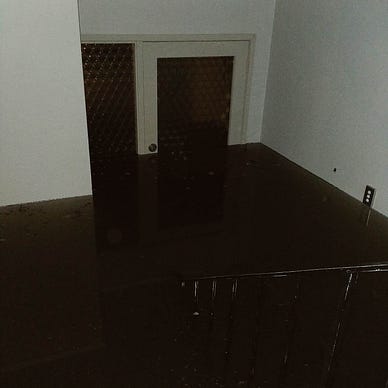An Archipelago in Denial Says What?
The world is an ocean; I’m staggered to feel safe at all
Safe?
I sit enfortressed by snug little
boxes
of steel and concrete,
329 meters above sea level,
more than 598 kilometers from the nearest
oceanic
coastline; 71% of the planet’s surface
is covered in
ocean— the average depth
of which is a measly
3,688
meters.
Is anyone
safe?
Thank you, Lucy Dan 蛋小姐 (she/her/她), for having me once more in your absolute TREASUURE of a publication, ‘The Brain Is a Noodle’. Did you know we’ve already discovered numerous cities underwater? Surprisingly, I didn’t!! Maybe. I’d also like to apologize officially for retracting my previous story in order to keep the original — ? — AI artworks. Then for editing it as a lazy response. From one Canadian to another, and now that I’ve seen The Mandalorian, well— this is the way, eh?
“This is the way.”
— All Mandalorians in ‘The Mandalorian’ who walk The Way
To apologize, I mean.
I swear to you, I’m NOT an anarchist, hence today’s strict adherence to your standards!!
Note: Author might be an
anarchist, albeit
a cautious -?-
one.Now, today’s headline is really a little silly, not because I compare continents to islands, but since it assumes the PLANET ITSELF as my target audience. And I doubt the Earth identifies as anything, or cares about what we call its land masses.
So—
Here’s a fun fact to help you visualize the difference between continents and islands:
An island is a body of land surrounded by water. Continents are also surrounded by water, but because they are so big, they are not considered islands. Australia, the smallest continent, is more than three times the size of Greenland, the largest island.
The Truth
Fine, I’ll level with you; I’m deathly afraid of the ocean, and prefer focusing on the land aspect of this lovely ball we call home.
You see, calling them “continents” helps us feel safe. But realistically, even collectively, these oversized islands don’t amount anywhere near the grandeur of The Colossal Body of Water encircling them neatly in times of calm; it’s not even close.
The deepest part of the ocean is called the Challenger Deep and […] is approximately 10,935 meters (35,876 feet) deep.
And be real, we have no clue what’s down there — don’t even feign it— so let’s just pretend it’s not all around us, yes? I mean, seriously, only 29% of the planet isn’t ocean, and with global water levels rising every year, whatever happens, I feel ENGULFED.
You hear?
Maybe I’m a little paranoid.
Still—
The rising water level is mostly due to a combination of melt water from glaciers and ice sheets and thermal expansion of seawater as it warms. In 2021, global mean sea level was 97 millimeters (3.8 inches) above 1993 levels, making it the highest annual average in the satellite record (1993-present).
With this being the case, I ask myself, since I’m so afraid of the ocean, then what of the 410 000 000 people at risk of being displaced within the next 70+ years alone?
As natural disasters go, at least this one can be planned around?
According to the World Economic Forum, we’ve got floating homes, mobile barriers, ‘sponge’ cities — which are designed to take advantage of the rising sea levels for city functions — fancy computer programs to recreate cities and simulate specific conditions to help prepare a response in advance, complete relocations, and more solutions are being brainstormed, designed, and exercised to prepare for the oncoming threats by the day.
Personally, I’m very inviting to immigration, as even in 2023, Canada has a ridiculous amount of liveable space leftover.
That’s accounting for our greedy lifestyles, the endless highways, parking lots, and general corporate spaces— I don’t even want to think about it. The developed world appears to fit in the pockets of oil companies, which is bonkers, because we really don’t NEED to rely on their product anymore. I mean, consider hemp alone.
Now there’s a substance we can exploit!
But we need to get a move on—
The Tyndall report echoes the IEA in finding that no new oil and gas fields can be developed: there is no room for any country, at any income level, to increase its oil and gas production.
It further finds that limiting warming to 1.5°C requires the richest countries to phase out oil and gas production by 2034, to give lower income nations longer to replace their income from fossil fuel production.
The poorest countries should be given until 2050 to end production, but they will also need significant financial support to transition their economies within that time frame.
Just remember, we’re running out of time, then shit REALLY goes down. 📉 📉 And why upset the ocean in the first place?



About the Author:
🔍 ㅤGustave Deresse Is a Canadian Writer, Editor, Roamer & Musical Artist Exploring Themes as Spirituality, Logic, Love, Life, Technology, Philosophy, Nature, Art, Neurocognitive Psychology, Creativity, Writing, Humour, Inspiration, Music, Well-being — and the Weird.
P.S. Subscribe by email to catch my original works! ✨
My Introduction Page —
Or, enjoy one by Grandma Smillew—
I appreciate you,
take care.
Sincerely,
— G

